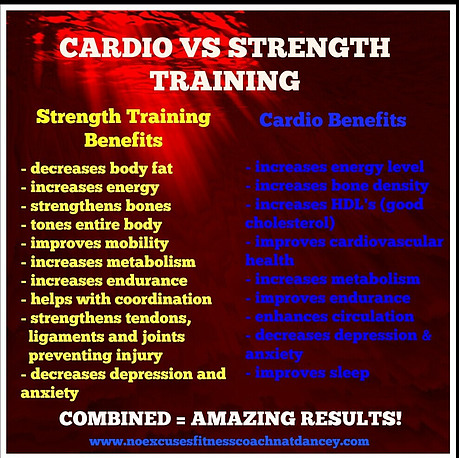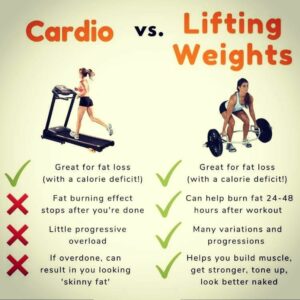
When I talk about cardiovascular exercise, I’m referring to the kind of physical activity that revs up your heart rate and boosts your lung capacity. It’s the kind of workout you’d typically associate with running, cycling, or swimming—the activities that keep your heart pumping and sweat dripping.
Strength training, on the other hand, isn’t about chasing breathlessness. It’s the exercise where you challenge your muscles against resistance, aiming for toned arms, a more muscular back, or more solid legs. The resistance might come from free weights, machines, or even your body weight with exercises like push-ups and squats.
Both forms of exercise have distinct benefits that affect various aspects of your health. Cardiovascular workouts are champions for improving your heart health and increasing your stamina. Meanwhile, strength training is your ally in building muscle strength and maintaining muscle mass, which can wane as you age.
Including various workouts in your fitness routine isn’t just about spicing things up; it’s essential for achieving comprehensive health. If you focus solely on cardio, you could take advantage of the metabolism-boosting benefits of muscle. And if you only lift weights, you may not develop the heart resilience that comes from a good run.
Benefits & Drawbacks: A Comparative Analysis
When we talk about cardio and strength training, it’s a tale of two different yet equally important benefits. Cardio workouts like running, cycling, or swimming are your go-to for improving cardiovascular health and endurance.
However, cardio could be more flawless. More can lead to muscle loss, and if balanced with strength training, it might strengthen overall body composition. On the other side, strength training, which focuses on lifting weights or using resistance bands, is excellent for building and maintaining muscle mass.
But as with cardio, too much strength training might not give your muscles the time they need to recover and grow. It also generally burns fewer calories during the workout, which may slow weight loss efforts if not combined with cardio.
It is a common misconception that strength training will always result in bulking up. Achieving a bulky physique requires a particular and intense bodybuilding approach. For most people, strength training will tone muscles and enhance strength without the bulk.
Exclusively focusing on cardio or strength training comes with risks. An all-cardio routine can lead to imbalances that might increase injury risk, while an all-strength agenda may neglect heart health. What’s crucial is finding the right mix to avoid the downsides of each training style.
Striking the Perfect Balance for Your Lifestyle
I’ve found that the key is to personalize your routine according to your goals, preferences, and medical history. To successfully combine cardiovascular exercise and strength training, start by outlining your goals. Do you want to lose weight, enhance endurance, build muscle, or all of the above?
Setting realistic goals and understanding that changes take time to happen is essential. If weight loss is your focus, incorporating more cardio can help burn calories. On the flip side, keep the weights strong if increased strength is your aim. Remember, though, that balance is crucial. Too much of either can lead to injury or burnout.
What experts recommend is consistency coupled with variety. Varying your workouts prevents boredom, challenges different muscle groups, boosts overall fitness, and minimizes injury risk. Feel free to mix it up with varying intensity levels and types of exercise.
As you age, your body’s needs change. An exercise routine that worked for you five years ago might be less effective or appropriate now. Pay attention to how your body responds after workouts. Persistent soreness, fatigue, or injury are signs you may need to adjust your exercise balance.
Listening to your body is the best advice I can offer. It tells you when to push harder and when to pull back. An effective exercise program is flexible, adapting to your changing needs and circumstances.
https://www.wealthyaffiliate.com?a_aid=352a86b2
Top Fitness Trainers THAT ARE CERTIFIED
Best Exercise Training Programs
Ultimate Inverted Training For Core Strength

